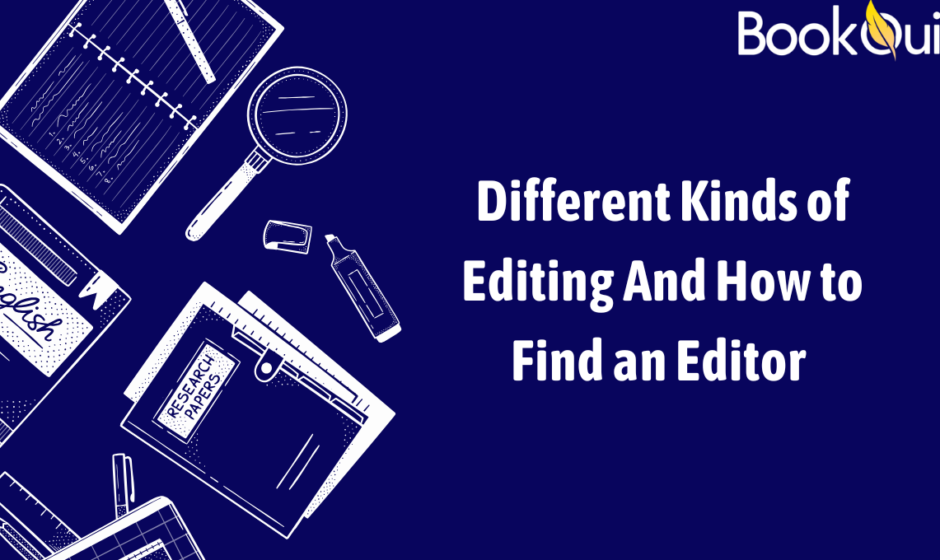So, you have finished writing your book, and you believe it’s time to publish it? Not so fast! Your writing needs careful editing. And trust me, a typo might be the least of your problems when it comes to editing.
“But what kind of editing does my masterpiece need?” is a question you may be asking yourself. Don’t worry! Whatever genre you have written in, be it thriller, horror, or romance, there are different editing types that can prevent your work from becoming a disaster in the industry.
Let’s explore different forms of editing, their complexities, and how to find the top online book editor who can edit your work from ordinary to exceptional!
Key Takeaways
- Kinds of Editing: Understand the main categories, structural, developmental, copyediting, and proofreading, and how each improves your writing.
- Complexity Matters: The level of difficulty varies depending on the sort of editing, ranging from making broad adjustments to polishing grammar and punctuation.
- Select the Appropriate Editor: Before hiring an editor, make sure they are experts in the type of editing your book requires.
- Affordable Options: You can find affordable book editing services that meet the requirements of your project and your budget online.
The Kinds of Editing Styles Every Writer Should Know
You may believe that editing only involves correcting mistakes and comma placements. But, oh boy, you have got a lot to learn! The process of editing has many sides, with various editing techniques serving different functions.
1. Developmental Editing
Developmental editing is like being an architect for a book. Just as an architect ensures a building has a strong foundation, logical layout, and functional design, a developmental editor ensures a manuscript has a solid structure, clear narrative flow, and well-developed characters.
For instance, if a novel’s middle section feels slow or a character’s motivation is unclear, the developmental editor identifies these issues and works with the author to refine the story, ensuring it resonates with readers.
Level of Complexity: High. It involves rewriting some of your plot to make it more impactful and clear.
Things to Remember: Be ready to give up your valuable words if needed. Keep in mind that “killing your darlings” is a term all writers should understand and accept.
2. Structural Editing
Think that although the foundation of a house has been constructed, the rooms are not arranged correctly. You can rearrange those walls with structural editing! In short, it’s like arranging your book in the ideal sequence.
For example, if you have written “The Lord of the Rings,” but Frodo takes a detour and ends up at a café rather than Mordor, the structural editing will be the one urging you to restore that heroic voyage of Frodo quickly.
So, what gets fixed with structural editing? Character arcs (Frodo cannot suddenly become a ninja!), logical flow (why is Frodo looking for a ring at the local mall?), and pacing (no one wants a slow and dull plot!).
Level of Complexity: Medium. It all comes down to sorting and rearranging for improved flow.
Things to Remember: You should avoid leaving characters in situations that don’t serve the story or seem unrealistic.
3. Copyediting
Your go-to source for grammar correction is copyeditor. It’s like that one guy in your friend circle who always catches you when you say any wrong word or when you mistakenly write “loose” instead of “lose.”
Copyediting guarantees that there are no embarrassing spelling mistakes and that your text follows grammar guidelines. If you have written “The Hunger Games,” the copyediting makes sure that Katniss doesn’t quickly become a “frosted” instead of a “flustered” heroine.
As we all know how easily we make mistakes, a top online book editor who specializes in copyediting will help you with consistency, suggest better word choices, and remove those annoying punctuation mistakes without the hassle of leaving home.
Level of Complexity: Medium to Low. Fixing minor mistakes might seem small, but it has an impact on book presentation.
Things to Remember: Readers often associate grammatical errors with a lack of attention to detail and care, which can negatively affect their trust in the author and the information presented in the book!
4. Proofreading
Now that you have finished all the editing, it’s time for the finishing touch. Last-minute mistakes are caught by proofreading; you know they are there, but you are too preoccupied with other things to notice them.
Minor spelling, punctuation, and formatting mistakes that might have gotten lost in the earlier rounds will be discovered during proofreading. No one wants a latte when they request a cappuccino, so it’s like verifying your coffee order twice.
Level of Complexity: Low. However, it’s the last phase and essential to excellence.
Things to Remember: Don’t neglect proofreading! It makes the difference between a work that looks professional and one that appears to have been typed in a rush.
How Does Writing Editing Services Work?
“All these kinds of editing sound amazing, but how do I actually get them done?” Fortunately, there are professional editing services online that can take care of all your editing requirements.
1. Determine Editing Type
Knowing exactly what type of editing you require is important when hiring an editor. Do you need proofreading for your upcoming book or structural editing for your novel? To decide which kind of editing is ideal for you, the editor will probably want a sample of your work.
2. Search in Right Places
It’s not as simple as searching for “editor near me” on Google. You must be aware of where to search! There are many different types of professional editing services online, ranging from independent editors to full-service editing firms.
Professional companies are your best bet, as they have vetted editors specializing in different types of content. The perfect choice would be BookQuill, the top online book editor, if you need something done quickly and on a tight budget.
3. Discuss Pricing and Timeline
Editing costs differ due to the editor’s experience, project length, and complexity. Clarify pricing upfront, whether it’s per word, per page, or per hour.
Moreover, you don’t have to spend a fortune to avail of these services. There are affordable book editing services that can provide you with professional work at a minimal cost. Also, confirm turnaround times.
Wrapping Up
Editing is more about making your content look cohesive, error-free, and professional. Recognizing the different types of editing is the first step toward making your book a best-seller. Whether you need developmental editing for a story that could rival Game of Thrones, minus the dragons, or just a skilled proofreader to ensure you don’t confuse your readers with vague story details, understanding these editing processes is crucial.
Therefore, go ahead and get the top online book editor who can improve your writing and prepare for your book to shine like never before!
FAQs
Which Kinds of Editing are There?
The primary categories, which each focus on various facets of your writing, are developmental, structural, copyediting, and proofreading.
What Makes Editing So Important?
Editing makes your work more readable, corrects mistakes, and makes sure it is polished, professional, and interesting.
How Do I Determine What Type of Editing I Require?
Take into account the writing stage; if it’s a draft, developmental editing can be necessary. Go for proofreading or copyediting for punctuation and grammar.
Where Can I Find Services That Edit Books at a Reasonable Price?
With choices ranging from professional editing platforms to freelance editors, you may discover many affordable book editing services online.
How Does Writing Editing Services Work?
Depending on the kind of editing needed, editing services evaluate your work, provide recommendations for improvements, and help you increase readability, style, and correctness.



